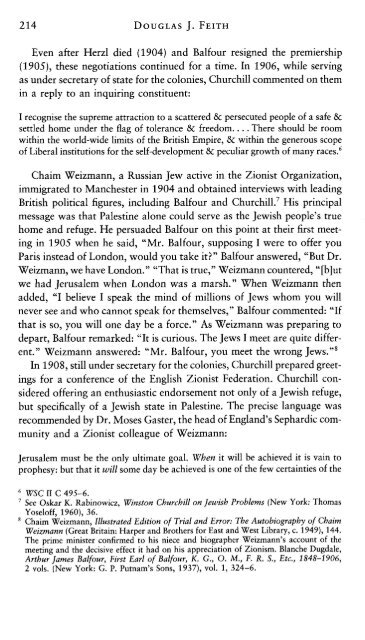Churchill, Palestine and Zionism, 1904-1922 - Douglas J. Feith
Churchill, Palestine and Zionism, 1904-1922 - Douglas J. Feith
Churchill, Palestine and Zionism, 1904-1922 - Douglas J. Feith
Create successful ePaper yourself
Turn your PDF publications into a flip-book with our unique Google optimized e-Paper software.
214 DOUGLAS J. FEITH<br />
Even after Herzl died (<strong>1904</strong>) <strong>and</strong> Balfour resigned the premiership<br />
(1905), these negotiations continued for a time. In 1906, while serving<br />
as under secretary of state for the colonies, <strong>Churchill</strong> commented on them<br />
in a reply to an inquiring constituent:<br />
I recognise the supreme attraction to a scattered & persecuted people of a safe &<br />
settled home under the flag of tolerance & freedom .... There should be room<br />
within the world-wide limits of the British Empire, & within the generous scope<br />
of Liberal institutions for the self-development & peculiar growth of many races. 6<br />
of Liberal institutions for the self-development & peculiar growth of many races. 6<br />
Chaim Weizmann, a Russian Jew active in the Zionist Organization,<br />
immigrated to Manchester in <strong>1904</strong> <strong>and</strong> obtained interviews with leading<br />
British political figures, including Balfour <strong>and</strong> ChurchilJ.? His principal<br />
message was that <strong>Palestine</strong> alone could serve as the Jewish people's true<br />
home <strong>and</strong> refuge. He persuaded Balfour on this point at their first meeting<br />
in 1905 when he said, "Mr. Balfour, supposing I were to offer you<br />
Paris instead of London, would you take it?" Balfour answered, "But Dr.<br />
Weizmann, we have London." "That is true," Weizmann countered, "[b Jut<br />
we had Jerusalem when London was a marsh." When Weizmann then<br />
added, "I believe I speak the mind of millions of Jews whom you will<br />
never see <strong>and</strong> who cannot speak for themselves," Balfour commented: "If<br />
that is so, you will one day be a force." As Weizmann was preparing to<br />
depart, Balfour remarked: "It is curious. The Jews I meet are quite different."<br />
Weizmann answered: "Mr. Balfour, you meet the wrong Jews."s<br />
In 1908, still under secretary for the colonies, <strong>Churchill</strong> prepared greetings<br />
for a conference of the English Zionist Federation. <strong>Churchill</strong> considered<br />
offering an enthusiastic endorsement not only of a Jewish refuge,<br />
but specifically of a Jewish state in <strong>Palestine</strong>. The precise language was<br />
recommended by Dr. Moses Gaster, the head of Engl<strong>and</strong>'s Sephardic community<br />
<strong>and</strong> a Zionist colleague of Weizmann:<br />
Jerusalem must be the only ultimate goal. When it will be achieved it is vain to<br />
prophesy: but that it will some day be achieved is one of the few certainties of the<br />
6 WSC II C 495-6.<br />
7 See Oskar K. Rahinowicz, Winston <strong>Churchill</strong> on Jewish Problems (New York: Thomas<br />
Yoseloff, 1960), 36.<br />
8 Chaim Weizmann, Illustrated Edition of Trial <strong>and</strong> Error: The Autobiography of Chaim<br />
Weizmann (Great Britain: Harper <strong>and</strong> Brothers for East <strong>and</strong> West Library, c. 1949), 144.<br />
The prime minister confirmed to his niece <strong>and</strong> biographer Weizmann's account of the<br />
meeting <strong>and</strong> the decisive effect it had on his appreciation of <strong>Zionism</strong>. Blanche Dugdale,<br />
Arthur James Balfour, First Earl of Balfour, K. G., o. M., F. R. S., Etc., 1848-1906,<br />
2 vols. (New York: G. P. Putnam's Sons, 1937), vol. 1,324-6.


